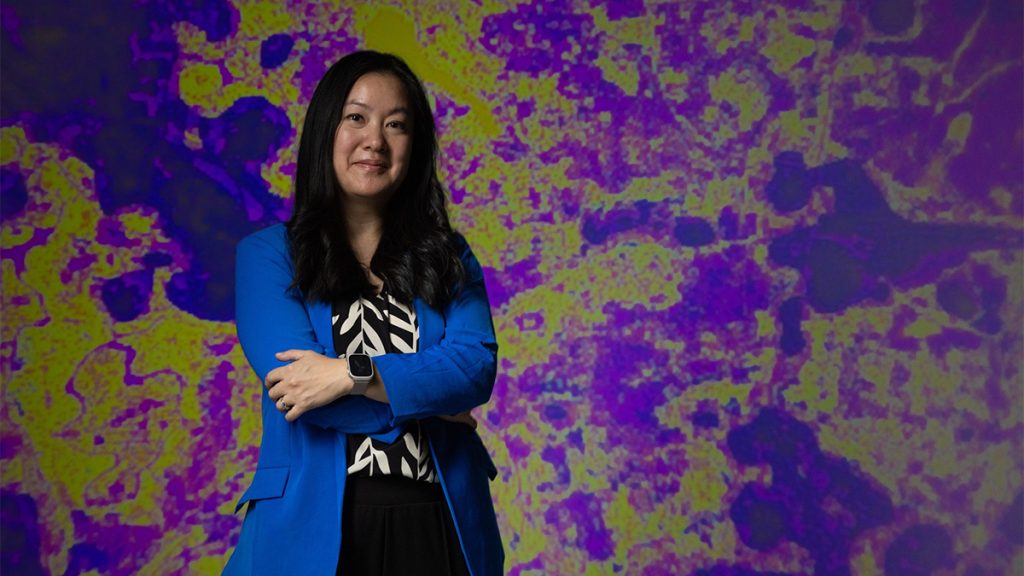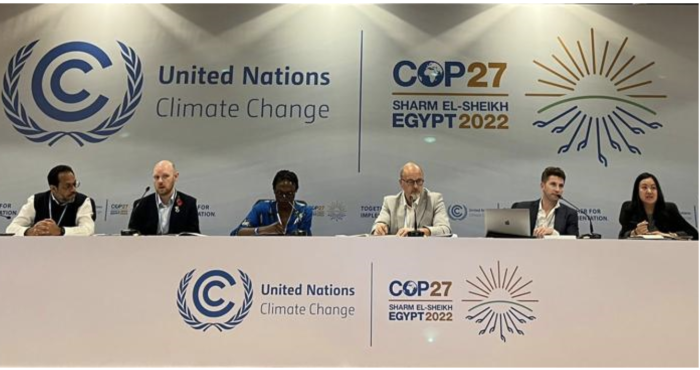At the COP27 summit in Egypt, Angel Hsu’s lab held companies and governments accountable for their promises.

Promises to reduce greenhouse gas emissions are often the focus at international conferences about climate change. Countries, coalitions and companies announce pledges and plans to combat climate change, but how do we judge their progress? The 27th United Nations Conference of Parties in Egypt focused on better ways to track how (or if) those promises are being kept.
Angel Hsu, founder and principal investigator of Data-Driven EnviroLab, was a key figure in the November conference’s emphasis on “global stocktaking.” Her lab presented its own assessment of climate action by cities, regions and companies. She was also one of 10 experts contributing to the National Academy of Science’s report on the need for better ways to measure and share data on greenhouse gases.
“One of our biggest recommendations was the need for a type of clearinghouse for decision makers to be able to bring together these different types of information,” Hsu said. “It’s currently very scattershot and everyone’s doing their own thing, and that’s created an incredibly heterogeneous and patchwork landscape of this data.”
Hear from the students
COP27: Student attendees’ reflections and Q&A
4-5 p.m. Jan. 11
Frank Porter Graham Student Union room 2518 B
Virtual attendees may join on Zoom.
Hsu selected 14 students from 45 applicants to go with her to COP27. An assistant professor in public policy and in the environment, ecology and energy program, Hsu was excited to be able to offer the opportunity for them “to see what we discuss in the classroom actually happening in real time.” Hooked since her first climate summit in 2009 in Copenhagen, Hsu called the conferences “a really fantastic culmination, bringing together scientists, policy makers and activists.”
The Well asked Hsu for her take on climate accountability and some of the outcomes of the COP27 conference.
How can remote sensing help with accountability on reaching climate goals?
Science and technology are playing an even greater role in climate negotiations and policy because we need some way of measuring what countries are doing. For example, methane was a big topic of discussion at COP27 because it is 80 times more potent as a greenhouse gas compared to carbon dioxide. But methane emissions are hard to measure because a lot of it is coming from landfills, wetlands, agricultural fields or oil and gas operations that are deep underground.
We need better ways of monitoring these emissions. And so that’s where Earth observation and these types of emerging technologies come in. The Climate TRACE project (a nonprofit coalition that searches satellite data to track emissions down to individual polluters), which is backed by former Vice President Al Gore, is one example of these other types of efforts that are now coming online.
Satellite remote sensing technologies and digital technologies through the internet of things can help us get more information about people’s activities: How much are cars being driven? What types of cars? Where are power plants located in the world? How often are those power plants running?

How is the Data-Driven EnviroLab working to improve climate goal accountability?
A lot of our work at the lab is focused on the role of nonstate and private actors — businesses, financial institutions and local governments — in trying to tackle climate change. My work over the last seven years, since the Paris Agreement officially recognized these actors’ contributions, has been developing new data sets and methods and models for how we can try to explicitly account for these efforts within global climate change assessments. I have been looking at the role of these different actors and their potential to help fill in some of these gaps in emissions and implementation, ambition and action that national governments are leaving on the table.
We published/completed a new analysis this year looking at what climate actions have been delivered. When the CEO of Coca-Cola says that they’re going to do something on climate change, how do they follow through? Our analysis looked at how these actions align with the larger need to achieve net zero emissions by mid-century. With collaborators from the University of Oxford and the Energy and Climate Intelligence Unit, among others, we’ve developed a tool called the Net Zero Tracker that is collecting data and develops a scorecard and evaluates how the largest companies and some national governments are doing on these various efforts.
How significant is the “loss and damage” fund created by the COP27 for countries particularly vulnerable to climate change?
The fact that COP27 was in Africa really highlighted the need for additional efforts on climate change adaptation. How can we help the least-developed countries, small island states and developing countries adapt to the consequences of climate change that they’ve already felt? That was a very obvious theme and message that these developing countries were very vocal about during the conference.
Countries like the U.S. have been very resistant to even talking about compensating these developing countries for the impacts of climate change because it implies culpability in this climate crisis. They were resistant to agreeing to a legal mechanism — so the fund itself is clearly not enough. But it is a huge step forward in addressing the historic consequences of developed countries’ contributions to climate change and the current impacts that these countries are suffering.
By Susan Hudson, The Well
